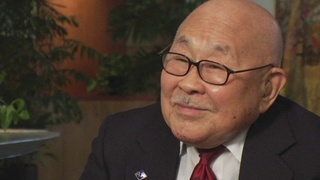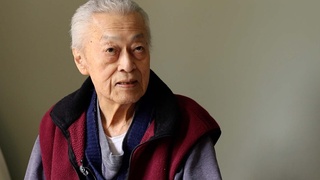Interviews
Starting to get angry
After basic training or during basic training, I got a furlough and came to LA and there was talk of evacuations so I helped my mother pack and then I went to the Japanese school where we did our kendo and the boy scout meeting[s] and I see many people moving into the classrooms and I said,” what’s going on here?” I says. “These are people from Terminal Island, they were booted out of there. And had no place to go, so they’re here.” So I said, hey how come they were booted out?
You know, that’s when I started to think, hey something is wrong here and I think that was the first time my blood began to boil, I think. Even in the army before that I had no problem- basic training, it was all mixed group, I had a little ROTC and the boy scouts- we had close order drill, so even the sergeant knew that’s why he had me leading the whole platoon, as just a trainee, you know, leading the platoon and all. I didn’t feel any discrimination in the army, of course later on I applied for officer’s training, then I was told “you’re not eligible” so I went for a non-com class to become a non-commission officer but there was slight indication of that I says, I guess I am Japanese and all that, but I didn’t blame anybody, I says, well such is life, you know, but it was at the Terminal Island “expulsion” you might say that, that’s the first time I start to feel a…I was starting to get angry, you might say.
Date: March 25, 2005
Location: California, US
Interviewer: Sojin Kim
Contributed by: Watase Media Arts Center, Japanese American National Museum
Explore More Videos

Influence of Mexican culture after returning from camp
(b. 1943) Japanese American transgender attorney

A conversation with a farmer in Kansas
(b. 1939) Japanese American painter, printmaker & professor

Dancing in Japan as an American, in the US as Japanese
(1918-2023) Nisei Japanese kabuki dancer

Discrimination in San Francisco
(1914–2015) Nisei YMCA and Japanese American community leader

Collection of artifacts depicting racial stereotypes influences art
(b. 1939) Japanese American painter, printmaker & professor

Encountering racial discrimination at a public swimming pool
(b. 1923) Nisei from Washington. Resisted draft during WWII.

His testimony has more credibility because of his race
(1922 - 2005) Former U.S. Army counterintelligence officer

Gender discrimination in education field
(1925 - 2018) Nisei educator from Hawai‘i

Learned what it meant to be called “Jap” in Heart Mountain
(1934–2018) Japanese American designer, educator, and pioneer of media technologies

First impression of New York City during war time
(1915 - 2011) Nisei florist who resettled in New York City after WW II. Active in Japanese American civil rights movement

The day Pearl Harbor was bombed
(1922–2014) Political and civil rights activist.

Not bringing shame to family
(1926 - 2012) Scholar and professor of anthropology. Leader in the establishment of ethnic studies as an academic discipline

Past ties to present situation in Middle East
(1926 - 2012) Scholar and professor of anthropology. Leader in the establishment of ethnic studies as an academic discipline

Didn't have rights that whites had
(1922–2014) Political and civil rights activist.

Californians didn't know about evacuation
(1922–2014) Political and civil rights activist.
